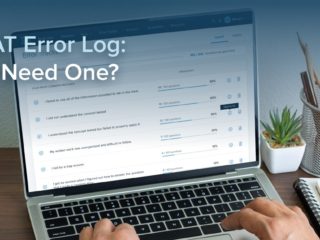| Getting your Trinity Audio player ready... |
Preparing to ace the GMAT in one month is an ambitious goal, and you may be wondering if it is possible.
Quick Answer: It’s possible to ace the GMAT in one month — if you follow a structured and intensive plan. Here’s a week-by-week strategy:
- Week 1: Build your foundation — Learn the GMAT format, take a full-length mock, and identify your weakest areas.
- Week 2: Targeted practice — Focus on improving your weakest sections through timed practice and review.
- Week 3: Mixed review + strategy — Integrate all sections, refine your timing, and build test stamina.
- Week 4: Full-length mocks + final polish — Take 2 official mock exams, review thoroughly, and taper off to rest before test day.
Use diagnostic tools, prioritize high-yield topics, and manage your stress and energy throughout. If you’re serious about mastering the GMAT in one month, stick with us! We’ve got all the insights you need to hit your target score.
Here are the topics we’ll cover:
- Where to Start
- GMAT Study Plan — 1 Month
- Realistic Expectations
- Available Resources
- Key Takeaways
- Frequently Asked Questions (FAQ)
- What’s Next?
Where to Start
The biggest determinant of how to study for the GMAT in one month is where you’re starting from. Thus, a GMAT one-month study plan for a seasoned student who is familiar with the exam and their own weaknesses will be different from a new tester’s plan.
KEY FACT:
Your current skill level will determine how you structure your one-month GMAT crash course.
Current Skills
Before diving into accelerated GMAT preparation, take an official mock exam. This will give you a starting score and some exposure to questions. Then, after taking the mock, review all of the questions and their answers. Consider a GMAT one-month strategy for someone who understands concepts but missed questions due to missing keywords or careless mistakes. For this student, the plan may focus on slowing down and taking the time to understand the question being asked.
Before diving into accelerated GMAT preparation, take an official mock exam.
Accelerated GMAT preparation is more accessible for those with a clear understanding of their weaknesses, so take the time to narrow yours down.
Here are some areas to think about:
- What are your current skills in each section? Where did you perform well?
- What sections and question types are least intuitive for you?
- How was your energy or mental stamina during your mock?
- Which sections do you perform well in when your energy wanes, and which sections require you to be at your highest mental energy? What section order would serve those needs?
- How was your timing? Did you finish every question? Were you rushing at the end, or were you able to pace yourself well?
Understanding your starting point will help you allocate time wisely and prioritize high-impact areas.
Goal Score
What is your goal score? Naturally, the higher it is and the further away it is from your current score, the more work it will take to achieve.
Look at the schools and programs you’re interested in to get an idea of what your goal score should be. For example, a passing GMAT score for a top-10 program will likely be higher than the same level score for a top-50 program. After you have an idea for a goal score, look at the percentile ranking that goal score equates to. The percentile is helpful for determining how difficult it will be to achieve.
A point increase of 495 to 555 (the Focus equivalent of 500 to 600 on the GMAT 10th edition) will require some work. However, a point increase of 555 to 645 (the Focus equivalent of 600 to 700) in one month will require significantly more work.
KEY FACT:
Knowing how to pass the GMAT in one month is partially dependent on your goal score.
Want more insight into setting a goal score? Check out our GMAT Focus Score Chart and Calculator.
GMAT Study Plan — 1 Month
What’s the most efficient GMAT study schedule for one month? Personal strengths and prior experience can affect the topics you should spend the most time on. Here is a general one-month GMAT study schedule. It focuses on weekly goals and priorities and is adaptable.
Week One — Foundation
- Familiarize yourself with the GMAT’s structure. Learn about the sections, layout, available tools, timing, etc.
- Take your first mock exam to get a baseline score and a feel for the testing experience. This exam should be taken in conditions as close to real conditions as possible. Specifically, this means no extra breaks or pauses, a quiet room without distractions, and so on.
- Consider taking an additional diagnostic test, such as TTP’s Free GMAT Diagnostic Test.
- The questions on official mock exams are randomly selected, which can lead to an uneven representation of potential topics. Diagnostic exams are often designed to present a more representative sample so you can better identify weak areas.
- Analyze your results and develop a list of high-yield topics to focus on.
Week Two — Focused Practice
- Start learning about the weak concepts you identified with the mock exam.
- Familiarize yourself with each section and find which one needs the most attention.
- Start developing the mental stamina necessary for GMAT success. Study in blocks that are 30–60 minutes long.
- Do focused practice sets that take questions from one section at a time.
- Note any questions you miss. Read the explanations of the correct answers and then mark them to try again.
KEY FACT:
Understanding why you missed a question is crucial for improvement.
Week Three — Refinement
- Check in on your list of weak topics.
- Are there any that you were able to quickly improve?
- Are there any that will need more attention than you predicted?
- Increase study block time to 60–90 minutes per session.
- Incorporate mixed practice sets that mix questions from various sections.
- Review your previous list of missed questions and reattempt them to see if you employ a better approach the second time.
- For any new (or recurring) missed questions, mark them for a further attempt in a few days. Make sure you understand why you’re missing them.
- Try to meet timing targets that resemble the GMAT — approximately 2 minutes per question, depending on the section.
- Take and review another official mock exam.
Week Four — Full-Length Practice
- Take 2 more mock exams, several days apart.
- Spend plenty of time reviewing the results of the mock exams to ensure you’re getting the most out of them.
- Practice should be in test-length blocks, about 120 minutes per block.
- Identify any remaining errors that you have time to improve on.
- Don’t cram for the last day or 2 before your exam, and focus on getting plenty of rest to help you perform at your best.
Additional Considerations
- As you work through this guide, notice external factors that might affect your test-day performance.
- If you struggle with test anxiety, focus on building up confidence to combat that.
- Prioritize stress-minimization techniques, such as exercise and meditation. The less stressed your mind is, the easier learning will be.
- Get plenty of sleep and eat well. The better you take care of your body, the more it can do for you during your test prep marathon.
TTP PRO TIP:
The better you manage your health and stress during prep, the more you’ll get out of studying.
Retaking the GMAT
If you’ve already taken the exam and are trying to improve your score, you may have a clearer view of the areas where you need to improve. Often, the more you learn about the exam, the more you’re aware of what you don’t know. If you’re planning to retake the GMAT in one month, a thorough audit of previous practice problems and mock questions can identify topics with the most room for improvement.
TTP PRO TIP:
Define and target your weakest areas for GMAT rapid improvement.
Not sure whether retaking the exam is right for you? Check out our blog, Should I Retake the GMAT?, to explore more factors that can help you decide.
Realistic Expectations
Fast GMAT prep requires a few things to be successful. The most important thing is to be realistic about your expectations.
How much time do you really have to study? More time per week doesn’t necessarily lead to more learning achieved. With only one month to prep, you’ll want to study to the point where you’re getting the most out of it, but not to the point of exhaustion. For those studying full time and not working or heavily committed to family and social activities, the number of hours will be higher.
KEY FACT:
More hours spent studying per week do not necessarily lead to more learning achieved.
To maximize GMAT prep in one month, consider taking time off work and opting out of extra social activities. This leaves you more energy for learning.
Score improvement goals should also be realistic. It would take a lot of work to go from a 50th percentile score to a 98th percentile score, and one month is unlikely to be adequate. Setting a challenging goal can be motivating. However, setting an excessively high goal can lead to frustration. Thus, unrealistic score goals can actually impede your score improvement ability.
If you want to minimize the time you spend on GMAT prep, set expectations with that in mind.
Available Resources
Making use of available resources is a good way to save time and focus on what matters. For example, using a pre-crafted study plan, signing up for a class, or consulting with an individual tutor are all potentially good options.
A pre-crafted study plan can enable you to spend less time planning and more time learning. They’re also often designed with high-impact topics in mind and are built by people who know a lot about the GMAT. Read through reviews to find an option that can teach you how to clear the GMAT in one month.
Many students do well in a classroom setting, which allows them to learn with peers. Depending on your specific schedule, flexibility, and learning needs, this might be a good option. Reach out to instructors to set up a consultation and review your timeline goals to see if they align well with the classes offered.
Working with a tutor can help you craft a custom plan for how to prepare for the GMAT in one month. If your goal is speedy prep, then having an expert look directly at your performance can save a lot of time and help maximize study efficiency. They can also potentially offer quick GMAT tips specific to your skills.
Finally, there are many free resources available to help you on your journey. Here’s a guide to TTP’s Free GMAT Resources.
TTP PRO TIP:
Look into the resources available and see if any can help you maximize your one-month study returns.
Key Takeaways
- Where you’re starting from informs how much work it’ll take to get to your GMAT goal score.
- If you want to study for the GMAT in one month, get a baseline score by first taking an official mock.
- Pick a goal score by looking into the schools and programs you’re interested in.
- Week 1 should focus on foundational knowledge of the exam and its sections.
- Week 2 is when you focus your prep on the topics where you need the most improvement.
- Week 3 is when you refine the prep strategies you’ve implemented for maximum impact.
- Week 4 is the time for full-length practice tests and relentless review.
- Test stamina is key for success, so build up your stamina throughout your one-month study plan.
- Remember to manage stress, sleep, and health as you prepare for the exam so that you’re primed to learn as much as possible.
- It’s great to challenge yourself, but be realistic about improvement expectations in a limited amount of time so you don’t set discouragingly high goals.
- Make use of the many GMAT resources available to help maximize your test prep efficiency, such as using a premade self-study program, signing up for a GMAT class, or consulting with a dedicated tutor.
Frequently Asked Questions (FAQ)
Can you prepare for the GMAT in one month?
A one-month GMAT prep timeline is absolutely possible! Improvement potential depends on where you’re starting from, how much time you have to study each week, and your goal score.
To see if this is a realistic timeline for your goals, get a baseline score by first taking an official mock. Then identify a goal score by looking into the programs that you’re interested in applying for. Finally, see how large the gap is between those 2 numbers. It can also help to look at percentile rankings of your baseline and goal scores to get a clearer sense of how much improvement you need.
Which GMAT topics should I prioritize if I only have one month to study?
The best thing to focus on if you have limited prep time is your own weakest areas. These can take some work to figure out, but GMAT official mocks and diagnostic exams from GMAT prep companies can help.
You can also choose to focus on the most common topics from each section. However, there’s no guarantee that less common topics won’t pop up on your GMAT, so it’s wise to at least look through those as well, even if you don’t spend as much time on them.
For quant, the most common topics are algebra, arithmetic, and word problems.
For verbal, the most common critical reasoning topics are identifying assumptions, strengthening/weakening arguments, resolving paradoxes, and method of reasoning. On reading comprehension, the most popular questions are primary purpose, inference, detail, and structure.
On data insights, expect to do graphics interpretation, table analysis, data sufficiency, two-part analysis, and multi-source reasoning on both quant and verbal subjects.
TTP PRO TIP:
Identifying your own weakest areas will help you focus on topics with the greatest impact.
For more information about the most common topics on the exam, check out our guide to What is on the GMAT?
Can shortcuts or quick strategies improve my GMAT score in one month?
While shortcuts and quick tips are appealing when working with limited time, the GMAT is hard to beat without a decent understanding of the topics. The GMAT is designed to test your reasoning skills. Learning how to reason through questions in a way that leads to a high score is useful for business school and beyond.
It’s better to spend more time preparing and actually developing these skills before you start an MBA or other business program. If you really want to use quick tips, make sure they’re universally applicable or that you understand clearly when to use them. Many quick tips or hacks are only useful for very specific questions, which can lead to getting similar questions wrong because the tip doesn’t work as intended.
What’s Next?
Now that you’ve learned about preparing for the GMAT in one month, you may want to learn more about the topics covered. Check out our guides on GMAT Verbal Question Types and GMAT Math Basics to see where to start for each section.



